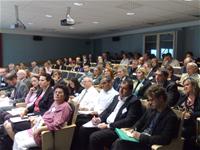The non-integration of Roma is harming the economy
Adelina Marini, October 2, 2009
 Education of Roma is the basis for their integration - a fact as indisputable as the other fact that education is the foundation of every prosperous economy. And one more fact - on a European level, much more is being done to tackle the issue than on national one. This is what came out of the second seminar of the European Roma Platform in Brussels this week. But in spite of these facts, progress is slow in the countries with largest Roma population, among which Bulgaria too.
Education of Roma is the basis for their integration - a fact as indisputable as the other fact that education is the foundation of every prosperous economy. And one more fact - on a European level, much more is being done to tackle the issue than on national one. This is what came out of the second seminar of the European Roma Platform in Brussels this week. But in spite of these facts, progress is slow in the countries with largest Roma population, among which Bulgaria too.
Choose the best mba programs for you.
The seminar was attended by the Commissioners Jan Figel, responsible for education and Vladimir Spidla who works on the social policy of the EU. According to the Slovak Jan Figel, whose home country also has serious issues with the integration of its large Roma minority, the key to deal with the segregation of Roma children in school is in providing pre-school education, education of elderly Roma and, last but not least, in motivating Roma parents to send their children to school.
And if the above sounds relatively easy to implement, practically it proves to be very hard.  According to a research of the European Roma Education Fund, Bulgaria is one of the very few countries where problems with Roma integration are handled by the civil sector. Although, in recent years there are some government initiatives, they still are not transformed into policies. Commenting on these results, the World Bank reports that the losses of the non-integration of Roma minorities in the economy are enormous, reaching hundreds of millions of euro because:
According to a research of the European Roma Education Fund, Bulgaria is one of the very few countries where problems with Roma integration are handled by the civil sector. Although, in recent years there are some government initiatives, they still are not transformed into policies. Commenting on these results, the World Bank reports that the losses of the non-integration of Roma minorities in the economy are enormous, reaching hundreds of millions of euro because:
1. the populations of the countries with Roma minorities is aging and, in the meantime, they have very high emigration towards richer EU member states and,
2. the economies of those countries, before the crisis at least, had rapid growth which led to serious shortages on the labour market. The Roma minority in Europe is the largest compared to all other minorities. According to some quite rough accounts, this is something between 10 and 12 million people.
The European Social Fund is one of the instruments for improving employ,emt of the Roma population. More money is being given under various programmes from the Structural funds of the EU. So far, according to the European Commission, more than 1 bn euro is being spent on measures directed to the most vulnerable groups. Soon it is expected the Commission to launch a pilot project, directed toward the development of new and integrated approaches to tackle the multidimensional problems of Roma.
But the participants in the seminar pointed out that a serious obstacle for the implementation of any projects are the local authorities and communities. Most mayors refuse to apply for projects, Andor Urmus from the Hungarian Ministry of Social policy shared. One of the reasons is that the government requites the mayors to provide anti-segregation plans. In spite of their resistance, so far 1,235 such projects have been developed. An interesting fact is that very serious budget is being allocated for the media - 20 mn euro in Hungary only.
 A very big problem in finding the right approach is the fact that in each country the segregation of Roma is at a different level, the attitudes of the majority and the government policies also differ. For example in Sweden, Roma children study together with the rest of the children in public schools. But the fact is that many of them leave school yet in the obligatory stage which starts from 7 years of age and lasts 9 years. Besides, many of the Roma in Sweden do not take advantage of the free mother language courses out of fear of ill-treatment once they disclose their origin.
A very big problem in finding the right approach is the fact that in each country the segregation of Roma is at a different level, the attitudes of the majority and the government policies also differ. For example in Sweden, Roma children study together with the rest of the children in public schools. But the fact is that many of them leave school yet in the obligatory stage which starts from 7 years of age and lasts 9 years. Besides, many of the Roma in Sweden do not take advantage of the free mother language courses out of fear of ill-treatment once they disclose their origin.
And in Bulgaria, according to the representative of the non-governmental association AMALIPE, Deyan Kolev, the problem is that there are many villages in Bulgaria where the Roma population is a majority which makes the desegregation impossible for transportation reasons. And is in Veliko Tarnovo there is a partial success with putting 20 children in Bulgarian schools with secured by the school transportation, in the villages with mainly Roma population this problem is quite expensive to solve.
There is a similar problem in neighbouring Romania. According to Letitia Mark from the Roma Education Fund, in the town of Timisoara with population of 300,000, there are 10 different minorities. They have used the example of the Bulgarian Danube town of Vidin by providing transportation for Roma children to go to school. But this, again, is a partial approach, according to the discussion in Brussels this week. It was also attended by NGOs from all over Europe, representatives of the World Bank, Amnesty International, journalists.
According to a representative of the Spanish Ministry of Social Policy, whose country will take the rotating Eu presidency from the 1st of January if the Lisbon Treaty is not in force, the approach towards Roma problems should not be separated into different parts like educations, infrastructure, homes. She said that all these sectors need to be considered in a package. However, this requires some very serious investments, mostly by the national governments. And, given the fact that most of the countries with large Roma minorities, are ex-socialists countries that have serious economic hardships for the 20 years transition to market economy, this makes things much more complicated.
Another problem, raised during the seminar, was the lack of a subject, taught at schools, related  to the cultural diversity. According to experts, knowing the different ethnic or religious groups in the European societies would lead to better understanding of their problems and to easier integration in the society.
to the cultural diversity. According to experts, knowing the different ethnic or religious groups in the European societies would lead to better understanding of their problems and to easier integration in the society.
In this regard the European Coalition for Roma policies dispersed a position in which they criticize the European Roma Platform for being unable to identify and define the important strategic areas towards which it is necessary an overall, coordinated and strategic approach within the EU to be found. Besides, the coalition, a member of which is the Amnesty International rights organisation, also criticizes the platform for not being transparent, for lacking sustainable planning and for the fact that it does not include Roma NGOs. The Roma platform does not have a specialized structure within the European Commission as well, and this is necessary for the platform to be more useful. That is why the coalition recommended the creation of a Secretariat in which devoted and skillful Roma people to take part.
But the largest problem which cannot be solved neither with money, nor with discussions, remains the attitudes of the majority. In most countries with large Roma minorities, parents are stumbling the desegregating of Roma children in schools by refusing to let their children to study in one class with Roma children. And the discussion over the issue often goes to dead end. But it is a fact that well educated Roma, though very hard, succeed in integrating themselves in the society and this can be seen with a bare eye.
A good example is Ivan Ivanov, executive director of the European Roma Information Office in Brussels. He has two university degrees - one in medicine and one in law. He speaks 2 languages, beside the very Bulgarian and can talk for hours about the problems of Roma. The more interesting in his story is that he is one of the very few Roma people who dare criticize the minority for not resisting the temptation to choose the easy way - beggary, pocket-picking, car thefts in Europe.
A result of his efforts to convince his fellow Roma that it is better to study and work honestly, is that he is rejected by Roma communities. In spite of this, his work in Brussels is related to lobbying before the European institutions to pay more attention to Roma problems. But he said that this is hard because of the too much politics which in some time of the efforts starts to prevail. And that is - the resistance of many EU member states to allow more attention to be paid to Roma minorities because this would lead to counteractions by other European minorities.
Another good example is Deyan Kolev from the AMALIPE associations. I was extremely surprised to find out in our conversation in Brussels that he also is a Roma. Until recently he was a teacher in Bulgarian language in a school in Veliko Tarnovo but now he is entirely dedicated to the association and he is also keen on talking for hours about the Roma problems and the policies for solving them.